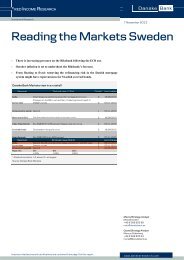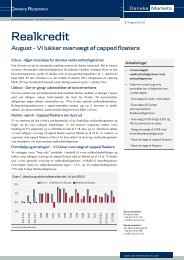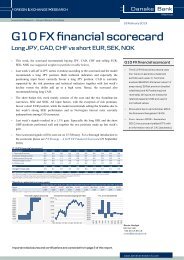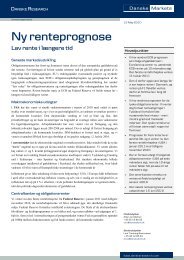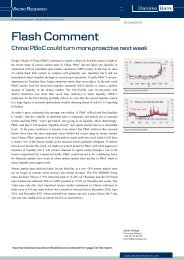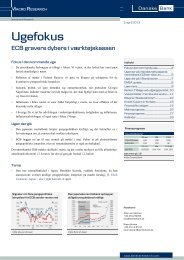Global Scenarios - Danske Analyse - Danske Bank
Global Scenarios - Danske Analyse - Danske Bank
Global Scenarios - Danske Analyse - Danske Bank
You also want an ePaper? Increase the reach of your titles
YUMPU automatically turns print PDFs into web optimized ePapers that Google loves.
<strong>Global</strong> <strong>Scenarios</strong><br />
have stabilised at 10.0% in March and industrial orders are pointing strongly<br />
upwards.<br />
Meanwhile, however, the euro debt crisis has escalated and there has been<br />
widespread contagion to most asset markets. Greece has called for an activation<br />
of a three-year EUR110bn joint EU/IMF aid deal on 2 May 2010 (see<br />
Flash Comment - Greece: EUR110bn programme approved), securing the<br />
country funding for its budget deficit for three years. Whether this is enough<br />
to avoid a debt restructuring remains an open question. The Greek aid deal<br />
failed to stabilise European government bond markets and it was shortly after<br />
on 10 May 2010 followed up by a massive European rescue package worth<br />
EUR720bn (see Flash Comment - EU agreement to combat crisis).<br />
The package is supplemented by ECB action. The ECB is providing liquidity<br />
and is buying up debt in Portugal, Ireland and Greece. PIIGS government<br />
bond markets have stabilised, but the ECB is still the only buyer and global<br />
investor confidence in euro area sovereign debt is expected to re-emerge only<br />
gradually as countries move ahead with fiscal consolidation. (see Research -<br />
Euroland: Q&A on the EU debt crisis).<br />
Portugal and Spain frontloads fiscal tightening<br />
Portugal and Spain have decided to accelerate fiscal tightening compared to<br />
their latest Stability and convergence programmes (SCP). The Greek EU/IMF<br />
programme involves accelerated fiscal tightening in 2010 compared with the<br />
Greek SGP, but not in 2011. In Italy, the government recently gave details of<br />
how it will bring down its budget deficit below 3% of GDP by 2012.<br />
Tighter fiscal policies will come at a cost of lower growth in the short term,<br />
mostly so in 2011. However, the accelerated fiscal consolidation will have a<br />
limited impact on euro area growth as Spain, Portugal and Greece only constitute<br />
around 18% of euro area GDP. These additional measures correspond<br />
to a euro area wide fiscal tightening of 0.1 %-point of GDP compared with<br />
available information from the SCPs, which formed the basis for our previous<br />
forecast. Hence the aggregate growth effect of the additional tightening will<br />
be very modest. However, for the involved countries the effects will be significant<br />
and the growth picture in the euro area will become less uniform in<br />
the coming years. Other member states may follow and frontload fiscal consolidation.<br />
This would dampen growth prospects for 2011 further.<br />
EUR weakening and low interest rates support growth<br />
The negative impact of the debt crisis on growth via fiscal tightening is countered<br />
by a positive contribution from EUR weakening and the resulting improvement<br />
in competitiveness. Since our previous <strong>Global</strong> <strong>Scenarios</strong>, the EUR<br />
has weakened about 8.8% against the USD due to the debt crisis and since<br />
the peak six months ago EUR/USD has declined as much as 18.4%. The<br />
nominal effective exchange rate (NEER) in trade-weighted terms has weakened<br />
somewhat less, namely 5.6% in the last three months and 12.7% since<br />
the peak.<br />
Estimates of the impact from a 10% NEER depreciation on euro area GDP<br />
growth varies from about 0.5 to 1.0%-point extra GDP growth on a one-year<br />
horizon. We apply the OECD model estimate of 0.8% and find that the last<br />
Unemployment is stabilising<br />
Source: Reuters Ecowin<br />
A tough challenge for Greece to overcome<br />
Greece<br />
Real<br />
GDP<br />
(1)<br />
Nom<br />
GDP<br />
(1)<br />
Primary<br />
public<br />
balance (2)<br />
Interest<br />
payments<br />
(2)<br />
Note: (1) % y/y, (2) % of GDP. Source: IMF & Greek authorities<br />
Fiscal tightening is being frontloaded<br />
Overall<br />
balance<br />
(2)<br />
General<br />
govt debt<br />
(2)<br />
2009 -2.0 -0.7 -8.6 5.0 -13.6 115<br />
2010 -4.0 -2.8 -2.4 5.6 -8.1 133<br />
2011 -2.6 -3.1 -0.9 6.6 -7.6 145<br />
2012 1.1 2.1 1.0 7.5 -6.5 149<br />
2013 2.1 2.8 3.1 8.1 -4.9 149<br />
2014 2.1 3.1 5.9 8.4 -2.6 145<br />
2015 2.7 3.8 6.0 8.1 -2.0 139<br />
Exp. public<br />
deficits, % of<br />
2010 2011<br />
GDP<br />
New SCP New SCP<br />
Portugal -7.3% -8.3% -4.6% -6.6%<br />
Spain -9.3% -9.8% -6.5% -7.5%<br />
Greece -8.1% -8.7% -7.6% -5.6%<br />
Source: Ministrys of Finance and Stability and Convergence Programmes<br />
(SCP).<br />
15 | June 2010<br />
www.danskeresearch.com



